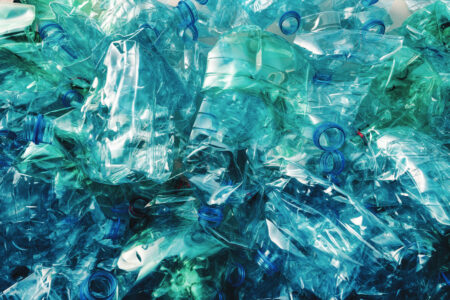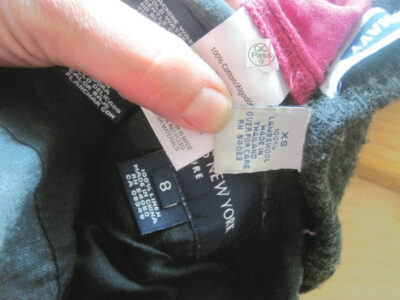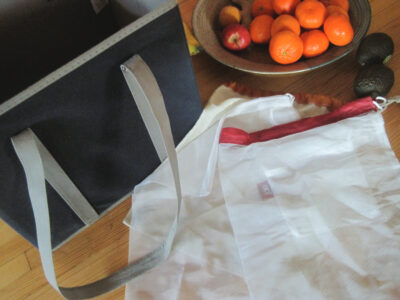“But we put it in the recycling bin! That triangle means it can be recycled!” The teachers at the elementary school sustainability workshop gave me a horrified look. I’d just explained that certain grades of plastic couldn’t be recycled, even if sorted correctly. Though they feature the recycling symbol, #6 and #7 plastics are unusable; they get sorted out of the recycling and sent to the general landfill with other waste. Thus began an awkward and largely futile effort to explain that recycling was the least important of the Three Rs – reduce, reuse, recycle. Of course, the teachers I was working with couldn’t be blamed – they were merely trying to impart responsible values to their students and doing their best. We’d all been told recycling was important. Getting the students to try to recycle at all meant something, right?
At a different class with an older group of kids, our sustainability program had students build models of imagined Earth-friendly buildings. The kids beamed proudly as they posed for pictures beside their creations, explaining that they were made from recycled plastic containers and repurposed “trash.” A few weeks later, however, the models ended up in the garbage anyway, their journey to the landfill merely postponed. I walked past the school’s dumpster with the sinking feeling that teaching people to recycle wasn’t doing much more than making us feel better about ourselves.
I’m not saying recycling doesn’t have its place and purpose. It’s kept glass, paper, metal, and some plastics in circulation longer than if they were merely used once. But it appears decades of recycling education have bred a society that considers itself “sustainable” if we simply put a plastic bottle in a blue bin. Years of teaching sustainability classes and being an environmental educator have convinced me that recycling has largely become a symbolic effort – that likewise produces symbolic results.
What Recycling Is … and What It Isn’t
So many of us believe we’re loving the Earth when we place our loaded blue bin on the corner or a plastic water bottle in a green can. But recycling isn’t the panacea it’s been touted as. While I do think recycling is useful and needed, I want to disassemble some of the scaffolding that’s been constructed around the idea of recycling – particularly plastic recycling – because for it to truly be useful, it needs to be regarded accurately. As a sustainability teacher, I noticed that recycling had become more of a propaganda slogan than a life-changing creed. Here are some accurate, yet unpleasant, truths about our “I-recycle-therefore-I’m-eco-friendly” culture.

- Recycling creates a baseless feeling of success. I’ve heard recycling compared with fixing a bookshelf in a collapsing building. You can stand back and admire your handiwork, but once the building is rubble, it won’t matter. As fatalistic as that metaphor sounds, I think we can all understand that until the problems with our “collapsing building” are taken care of, recycling merely addresses the symptoms, not the cause.
- Recycling doesn’t impact our daily lives. Not truly. Whether you’re buying a drink in a bottle made of virgin plastic or a drink in a bottle made of recycled plastic, you’re still consuming a product and will likely carry on the same way no matter what it’s made of. Recycling alone doesn’t affect our patterns of consumption or production of waste – most of us, whether we recycle or not, are still buying the same amount of stuff without a hitch in our step.
- Recycling is an impersonal, distant action. We aren’t personally responsible for making old materials into new – the items are whisked off to some unknown processing plant, out of sight, out of mind. All we can do is throw plastic in a box and hope it goes where they say it’ll go.
- Recycling isn’t an infinite loop. Plastics have a lifespan in terms of their recyclability. Containers can only be recycled if they’ve been cleaned thoroughly and processed appropriately – more items than you’d believe end up in a landfill anyway.
- Recycling doesn’t do what we believe it does. We’ve been told over and over again that recycling is good and makes a difference. But it’s hard to believe when there’s little difference to be seen. And the depressing, hard-to-admit fact is that many recycling programs don’t – and can’t – deliver on their promises. There’s just too much material to deal with, especially since China stopped buying most American plastic trash in 2018.
I’ve had several conversations with folks who thought my job as an environmental educator was a fruitless waste of time, and though I disagreed, I honestly can’t say I blame them. Trash lines the roads and clogs the sewers. The Great Pacific Garbage Patch slowly, inexorably swirls. Microplastics appear in fish – and humans – at the cellular level.
Though it may seem dire, I do believe a more realistic view of the world is necessary. The fact is, recycling alone won’t make the difference we need to put a stop to all the waste we produce. So what will? The first step is a perspective adjustment.
Changing a Complacent Mentality
When I was that environmental educator living in the city, I honestly thought I was making a difference. I faithfully recycled my own trash and made an effort to buy products made of recycled materials. I visited schools and gave demonstrations and helped with park cleanup efforts. I even sold crafts I’d made from waste materials. But I was blind to the fact that I was still a complete consumer, fully living the consumptive lifestyle I’d inherited from my middle-class American upbringing.
It wasn’t until I left the city and became a homesteader that I came face-to-face with my own waste and lifestyle. Many rural areas like mine don’t have a waste-collection service – and that meant, for the first time in my life, every bit of trash I produced, every bit of packaging I brought home, every disposable product I used was now my direct problem. Up until this point, I’d outsourced all of my personal responsibility for my consumptive habits. Now, there’s no sending it away into oblivion. Recycling alone hadn’t made my lifestyle less wasteful!

While we still drive glass and metal into town for recycling, I now know that reducing the amount of waste we purchase or create, and reusing materials to keep them from becoming waste in the first place, have become absolutely, critically important. I have a whole new perspective on what it means to live responsibly. Here are some ideas for lifestyle changes that make a difference.
Changes That Matter
As much as I hate the Great Pacific Garbage Patch, or the problem of microplastics, I quite literally can’t do anything about it. Even if I dedicated every waking hour of my life to getting rid of them, there’d be no effect. The problems are just too big. In light of these problems, this list of changes will seem laughably small and inconsequential. But these acts of reducing and reusing are at the personal level, and that’s the only level we actually do have the power to change. We could petition a congressperson to pass legislation to control plastic use, or try to start yet another awareness program about what plastics do in the environment, or run a fundraiser for plastic removal, but the truth is, you and I only really have control over our immediate world.
Also true, however, is this: If everyone took that personal responsibility, the effect would be society-shaking. As much as I wish we could, we can’t make plastic waste suddenly go away. But we can start canceling it from our daily lives. Plastic didn’t even exist until 1862. We were able to exist well without it, and if we want to, we can reclaim that life. Once you start looking for ways to eliminate needless plastic in your daily life, you may be shocked at just how pervasive this material has become.
So, that said, here’s an incomplete but personally impactful list of waste-reducing ideas to consider:
- Do a “scavenger hunt” in your house for single-use plastic items, then find a way to do without them if you can. Make it a game with your family to see how many you can stop “needing.”
- Forget those flimsy plastic produce bags: You can ring up fruit and veggies without them (or use reusable ones).
- New items are overrated. Use online and in-person resources to find used items; someone else is trying to sell what you’re looking for, guaranteed.
- Buy refurbished electronics: You’ll be continuing the life of perfectly usable tech without the packaging.
- Acquire goods alternatively: Trading and bartering aren’t dead. Try it, and you’ll see.
- Hang this maxim up somewhere you’ll see it: “Use it up, wear it out, make do, or do without.” Challenge yourself to implement it at least once a day in some way.
- Wean yourself off packaged food: Learn how to cook with whole ingredients. It’s better for you, and you’ll have less garbage.
- Use cloth diapers and reusable menstrual pads or cups.
- Make your own self-care products, and store them in glass jars.
- Nix the plastic wrap – try reusable containers and cloth napkins, or sew a bento bag to wrap and store food.
- Learn to use a safety razor instead of disposable ones.
- Make homemade snacks for your kids.
- Wash zip-close bags and reuse them – they last a surprisingly long time.
- Choose 100 percent natural fabrics (wool, linen, cotton). Once they wear out, you can compost them or repurpose them as cleaning rags or patches.
- Bring your own thermos to the café (some will fill it for you), and carry your own water in a reusable bottle.
- Reuse packaging: If you do a lot of online shopping and selling, the cardboard packaging from one incoming box can be used to pad your next outgoing shipment.
What Are the 3 R’s of Recycling?

Of the Three Rs, I can understand why recycling took center stage. It’s a good step to help people become aware of their waste production and the effects it has on their environment. It’s an attractive change to advocate for, especially since it makes you feel like you’re doing some good. It’s easy since it doesn’t require much of a lifestyle change. Just add a few new recycling bins to your building’s entryway, and presto! You’re eco-friendly!
Those other Rs, though – they’re challenging. Reducing and reusing are more difficult concepts to get people to embrace. For all the recycling programs out there – and you may even be able to name a few in your own area – how many “reducing” programs do you know of? Or how many “reusing” programs? I hazard a guess there aren’t many.
Reducing and reusing are more involved. They’re more personal. They require giving things up and may even cause a bit of social discomfort. Everyone can praise a school program that has kids tugging loaded recycling bins to the curb. But few would question why the recycling bins had gotten so full in the first place.
I understand that these concepts are difficult to implement and define. And they can be tricky to incentivize or profit from on a large scale. Rather than a relocation of items, these lifestyle changes demand a system overhaul. When you reduce how much you purchase, it doesn’t support the economy. Reusing items doesn’t contribute to anyone’s bottom line. All it does is make lasting change.
Wren Everett and her husband live on an off-grid Ozark homestead, where they seek to live as self-sufficiently as possible.
Originally published in the November/December 2025 issue of Grit magazine and regularly vetted for accuracy.







